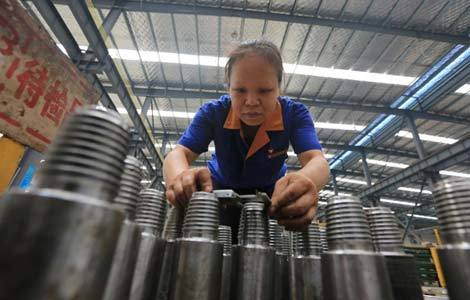Cabinet promises more funds for smaller firms
Updated: 2013-07-16 07:13
By Wang Xiaotian (China Daily)
|
||||||||
|
Clerks explain customized financial services for small businesses to a client at a China Minsheng Banking Corp branch in Nantong, Jiangsu province. The State Council has urged banks to offer better services to small businesses to boost their growth. Xu Congjun / for China Daily |
The central government vowed on Monday to improve financial support to small businesses, as new statistics showed the economy further losing steam amid a crackdown on shadow banking.
At a video conference held by the State Council, China's cabinet, Vice-Premier Ma Kai said that the threshold at which small companies could raise funds directly on the capital markets will be lowered "to some extent" and refinancing of listed small companies should start soon.
"The development of small financial institutions will be further encouraged to improve financial services to small businesses," Ma said, adding that the government intends to allow holders of private capital to set up banks, leasing firms and consumer-finance companies.
The growth of lending to small businesses shouldn't be lower than the average loan growth rate this year, and new loans extended to these businesses shouldn't be lower than the level of last year, said Ma.
"Given that we're continuing a prudent monetary policy and will keep total lending stable, to achieve these goals, the financial sector should restructure its capital and increase the proportion of lending to small businesses."
He said the central bank would guide banks to lend more to small enterprises by using tools such as re-lending, rediscounting and applying differentiated reserve requirement ratios.
People's Bank of China Governor Zhou Xiaochuan said on Monday that the central bank will maintain a prudent monetary stance and increase financial incentives for small firms, which are key job creators and sources of technological innovation.
"Financial support to small businesses will lead to stable and relatively fast economic growth," Zhou said.
China will steadily pursue market-oriented interest-rate reform and the establishment of a deposit insurance system, Zhou said.
Ma also called for the government to reduce the financing cost of small companies by penalizing financial institutions that impose "unreasonable" fees.
The National Bureau of Statistics announced on Monday a slower economic expansion in the second quarter. GDP growth moderated to 7.5 percent from 7.7 percent in the first quarter.
Total social financing in the first half exceeded 10 trillion yuan ($1.6 trillion), according to the central bank.
"The economy is not short of liquidity, but it requires a more efficient allocation of credit to the real economy and productive sectors as opposed to circulating within the financial system for regulatory arbitrage," said Chang Jian, China economist with Barclays Capital.
Money supply growth fell to 14 percent year-on-year in June, from 15.8 percent previously, which reflects the PBOC's policy bias for tighter liquidity in the second half compared with earlier in the year, according to Chang.
"Total outstanding credit has reached 68 trillion yuan. If we can raise the circulation of credit by 0.1 time each year, or shorten the average lending tenure by about one month, there would be extra loans of 6 to 7 trillion yuan," Chang added.
A senior executive at Industrial and Commercial Bank of China Ltd said: "The space for credit circulation and restructuring is very huge."
On July 5, the State Council released 10-point guidelines on how monetary and financial policy can stabilize growth and reduce financial risk.
The guidelines said that misallocation of capital is hampering economic restructuring.
They called for more credit support for upgrading, consumption and urbanization.
wangxiaotian@chinadaily.com.cn
(China Daily USA 07/16/2013 page13)

 Obama urges restraint amid protests
Obama urges restraint amid protests
 Putin wants Snowden to go, but asylum not ruled out
Putin wants Snowden to go, but asylum not ruled out
 Apple to probe death of Chinese using charging iPhone
Apple to probe death of Chinese using charging iPhone
 Investment falters as industrial activity flags
Investment falters as industrial activity flags
 Rape victim's mother wins appeal
Rape victim's mother wins appeal
 Reproduction of 'Sunflowers' displayed in HK
Reproduction of 'Sunflowers' displayed in HK
 Land Rover enthusiasts tour the world
Land Rover enthusiasts tour the world
 US star sprinter fails drug test
US star sprinter fails drug test
Most Viewed
Editor's Picks

|

|

|

|

|

|
Today's Top News
Spain apologizes to Bolivia for plane delay
International cotton contract in the works
Smithfield shareholder still presses for break up
China calls for new talks on Iran nuclear issue
Global warming may largely raises sea level
Putin wants Snowden to go, asylum not ruled out
US: China can balance own growth
Top foreign study destinations for Chinese
US Weekly

|

|







